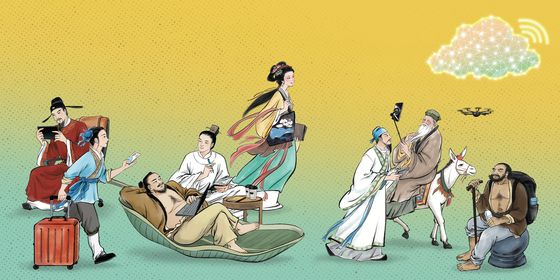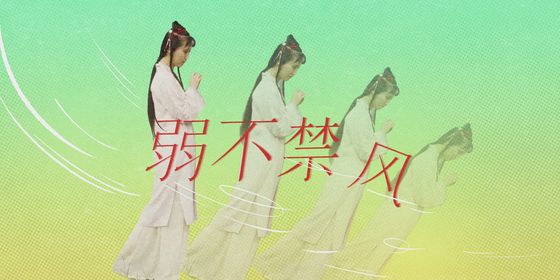TWOC’s guide to the dialect of Deng Xiaoping—and modern Chinese hip-hop
For over a decade, The World of Chinese has been offering modern Chinese-language instruction from street talk to social phenomena to character tales. With 129 officially recognized dialects (方言) in the land, though, we have barely scratched the surface of everything there is to learn.
On select Fridays, TWOC will be presenting a basic lesson on speaking like a native of a certain region of China. This week it’s Sichuanhua, the language of local hip-hop.
“Gua laowai, gua laowai, so many gua laowai!” spits rapper Xie Di (谢帝) in a viral video titled “Gua Laowai (Idiot Foreigners),” in which the Chengdu native uses his city’s dialect to diss obnoxious expats.
Once associated with Chinese leader Deng Xiaoping, whose lifelong accent came from this southwestern province, Sichuan dialect, or Sichuanhua (四川话), has seen a spike in its street cred since the local rise of rap in 2017. From pioneering rap artist Xie Di to Rap of China stars Wang Yitai, Li Jialong, ICE, and Vava, they all hail from either Chengdu or Chongqing and are proud of singing in the local dialect.
Sichuanhua is a practical dialect, or fangyan, to learn. Spoken by about 120 million people, it would be the 10th most widely spoken tongue, just behind Japanese, if counted as a separate language. Like Wuhanhua, and unlike the devilish Wenzhouhua, Sichuanhua belongs to the linguistic branch known as Southwestern Mandarin and can be intelligible to Standard Mandarin speakers. It’s easy to see that the common insult 瓜 (guā) in Sichuan dialect is related to 傻瓜 (shǎguā), or “idiot” in Mandarin.
However, Sichuanhua also has a unique history. It’s believed to have been influenced by the extinct Ba-Shu Chinese, the first Chinese variety spoken in the area of modern-day Sichuan. Compared to most other modern fangyan, which developed out of Middle Chinese, Ba-Shu was an off-shoot of Old Chinese. After the Mongol invasions in the 13th century, Ba-Shu’s influence dwindled and was eventually replaced by Mandarin varieties spoken by migrants from Hubei.
Some common rules in Sichuanhua:
- The zh, sh, ch sounds in northern varieties of Mandarin give way to z, s, and c, respectively.
- Sichuanhua features the notorious northern Mandarin trait of erhua (儿化) or adding 儿 to the end of words as a diminutive ending.
- The expression 不存在 (bù cúnzài), literally, “it doesn’t exist,” is used to mean “no problem” or “you’re welcome.”
- 要得 (Yáode) means “OK,” the same as Mandarin’s 好的 (hǎode) or 可以 (kěyǐ). There is a joke that Deng used to say yaode about 100 times a day, so eager was he to kickstart the reform and opening-up policy.
- 老子 (Lǎozi) is an arrogant way to refer to oneself. In “So Gangster (《超社会》),” a track by Rap of China champion GAI in 2017 with over 4. 2 million views on Youtube, the Chongqing native sings: “老子社会上的! (Lǎozi shèhuì shang de!),” or “I’m so gangster!”
Sichuanhua also uses unique modal particles to give sentences a certain attitude, and natives use them far more freely than in Standard Mandarin, often tagging one at the end of every sentence. Some common ones include:
- 嘛 (Ma) indicates suggestion or agreement, much like 吧 (ba) in Standard Mandarin. Because 嘛 is an emphatic particle that indicates impatience in Mandarin, outsiders tend to form the impression that the Sichuanhua tempers live up to the spiciness of the local cuisine.
- 嗦 (So) expresses suspicion or dissatisfaction. “你骗我嗦? (Nǐ piàn wǒ suo?You cheating me?”) is particularly useful for bargaining at the market or dealing with taxi drivers.
Here are five sample sentences spoken by a native speaker from Chengdu. Keep in mind that, though the Chengdu-Chongqing variety of Sichuanhua is, by far, the most widely spoken, there are small differences between the metropolises, and across the rest of the province:
- Come to Chengdu for a good time, Chengdu is a chill city.
Lai cengdu sua se, cengdu nieyide hen, basi debeh.
来成都耍三,成都安逸得很,巴适得板。
Invite non-locals to the city with this phrase, which features the unique Sichuanhua word basi (巴适)—meaning good, great, delicious, attractive, and basically anything positive. It’s believed to have Ba-Chu origins, and it’s combined with debeh (得板), a word used to add emphasis to something that is very comforting or pleasing. According to our speaker, this is because the word 板 conjures the image of a flopping fish on a plank (and this is comforting to Sichuanhua speakers).
- It’s so early, what are you up to?
Ei, qingzao basen neh, ni qie zhuazi leh?
诶, 清早八晨的,你切爪子喃?
After a night of hot pot and baijiu with your new Chengdu friends, you may not enjoy getting woken up the next morning. Express your annoyance with this phrase! Notice how Mandarin’s 去 (qù), meaning “to go,” has been replaced by 切 (qie), while the interrogative particle 呢 (ne) has been replaced by 喃 (leh).
- Let’s chat at the teahouse, dude!
Zou guolaogueh, qie tsagui baiher, longmenzen ma!
走哥老官 ,切茶馆摆哈儿龙门阵嘛!
A good pick-up line or conversation starter in Chengdu, a city famous for its tea-drinking culture: The equivalent of Mandarin’s 哥们儿 (gēmen’er), or “dude,” is 哥老官 (guolaogueh), while the verb “to chat” is 龙门阵 (longmenzen). This also contains an example of 嘛 being spoken where Mandarin speakers would say 吧.
- Damn it, the power’s been cut off, so annoying!
Oho, ting die lo, jiaoren dehen!
哦嚯 ,停电了,焦人得很!
If your house party with your Chengdu friends is spoiled by someone forgetting to pay the bills, lighten the mood with this sentence. 焦人 (Jiǎorén) is Sichuanhua for 烦人 (fánrén) or “how annoying,” but is pronounced with the third tone (jiǎo) rather than northern Mandarin’s first tone (jiāo).
- How come you’re so scared of your wife? What a soft-ear.
Ni za leme xu laopo le? Pa erduo so.
你咋这么虚老婆喃 ?耙耳朵嗦。
The word for “scared” (怕 pà) is 虚 (xū) in Sichuanhua, which means timid, while the particle for suspicion, so, is used teasingly. As the dialect’s illustrious career in rap suggests, Sichuanhua is great for dissing: 耙耳朵 (pà ěrduo), literally “soft-eared,” is what one calls a henpecked husband.












